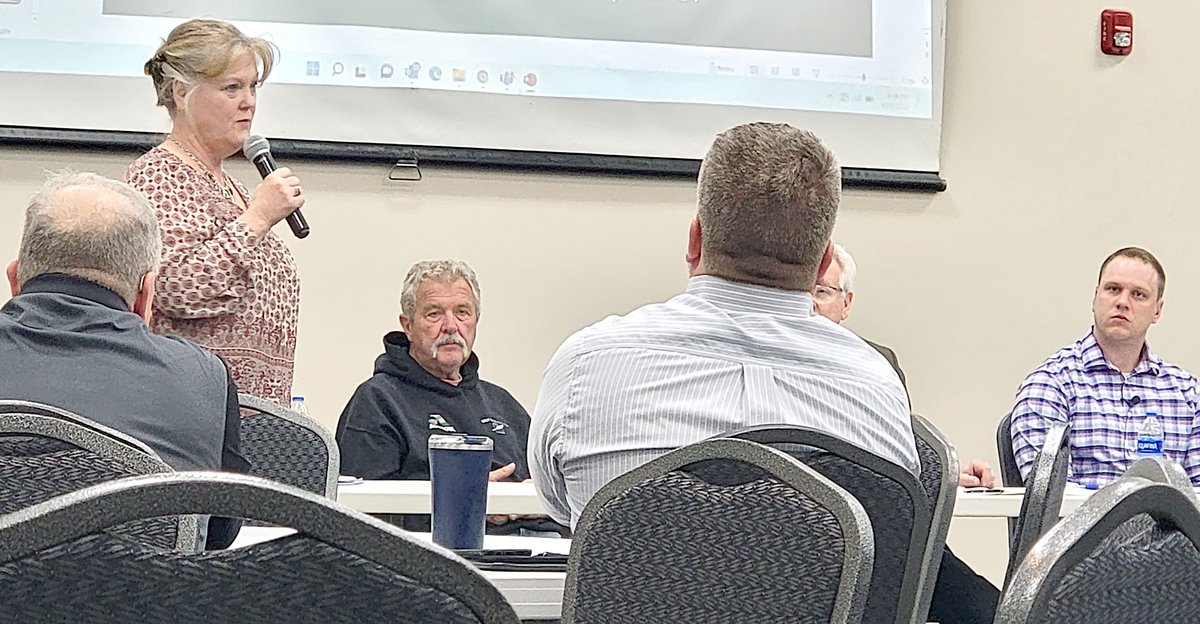In what officials have called a challenging budgeting year requiring creativity to balance spending with taxes, Barton County commissioners Monday night brought representatives from the myriad taxing entities in the county together for a brainstorming session as they launch the 2023 budget-planning season.
“This is about getting the taxing entities under one roof and see how we can accomplish our goals in a collaborative way,” said County Operations Director Matt Patzner in his opening remarks. “How can we help each other do more?”
In all, there are 54 taxing bodies that are entirely within the county or include a sliver of it, not all of which were represented at the gathering. These include the county, cities, school districts, hospital districts, libraries, fire districts, recreation commissions, townships, Barton Community College and others.
A crowd of about 40 gathered in the Great Bend Events Center main ballroom for the meeting that lasted less than an hour.
County commissioners and administrators sat at the head of the room. They took turns outlining the hurdles facing all those in attendance.
“To me, communication is key,” said commission Chairman Shawn Hutchinson, District 3. “I think of Barton County as one big community.”
Although the Monday night gathering was brief, Hutchinson said he hoped the conversation continued beyond the meeting.
“Clearly, we aren’t going to solve every problem in this room tonight,” Patzner said. But, “let’s keep this collaborative effort going.”
The commission, which called the meeting, won’t meet for its regular session Wednesday morning due to conflicts with the Kansas County Commissioners Association conference Tuesday through Thursday in Salina. It did hold initial budget talks with department heads following its meeting last week.
Some of the issues touched on Monday included:
Revenue neutral
The revenue neutral bill, which is impacting taxing bodies for the second year.
What is revenue neutral?
In the waning days of the 2021 session, the Kansas Legislature passed Senate Bill 13. Dubbed by the Senate as the Truth in Taxation or the revenue-neutral bill, The aim was to make the state’s complex tax system more transparent.
In a nutshell, SB 13 prohibits all taxing entities (from counties to townships to school districts) from increasing their tax collections by more than they did the year previous. This means, if an entity’s valuation (the total value of all property) goes up, the mill rate would have to go down to collect the same amount of taxes.
In addition, it establishes a requirement of notices to taxpayers and public hearings for municipalities seeking to collect property taxes exceeding their revenue-neutral rate.
“This confuses the taxpayer,” Patzner said.
Ellinwood City Manager Chris Komarek asked for a show of hands to see how many entities present planned on raising their mill rates, thus requiring a hearing. Most indicted they are looking to hold steady or lower their rates, but noted it is too soon to tell for sure.
“We need to find a balanced approach to minimize the burden on the taxpayer,” Patzner said.
Property taxes
County Appraiser Wendy Prosser likened taxes to a three-legged stool. One leg is property tax, one is sales tax and one is income tax.
However, through various state statute changes, “that stool is becoming very disproportionate,” she said. There is more and more emphasis being placed on property taxes making it difficult for the county and other bodies to keep their mill levies down.
Inflation and other economic pressures have also increased home prices, thereby increasing valuations, Prosser said. It has gotten to the point where residential property accounts for 87% of the county’s total property value.
Her office is sometimes seen as the bad guy, she said. But, they don’t set or collect taxes, they just fairly determine what properties are worth.
“We are taxing people out of their homes,” said District 2 Commissioner Barb Esfeld. She challenged those present to come up with ways to reduce property taxes.
“We want our parks, we want our college, we want our schools, we want it all,” she said. “The mill levy is all of us paying for the same thing.”
Progressive thinking
I’ve been a part of county government of 18 years,” said District 5 Commissioner Jennifer Schartz. “I’ve seen lots of things happen.”
There have been lean times, but now things are looking better than they have in the past. She’s appreciated being on a progressive commission which has tapped the various state and federal COVID-19 relief funds for projects like the Neighborhood Revitalization Plan and the Facade Improvement Program.
A state promise
Great Bend City Administrator Kendal Francis said local officials need to pressure the state keep its promise and return to implementation of the Local Ad Valorem Tax Reduction Fund as a way to help local governments keep their property taxes low. Previously funded by 3.63% of the state sales tax, the LAVTRF has not been funded since 2003.
If fully funded again, local governments would once again have a strong tool to begin lowering local property taxes.








